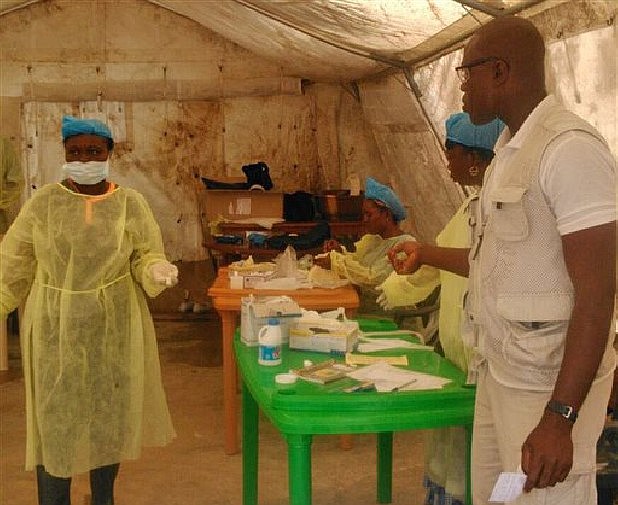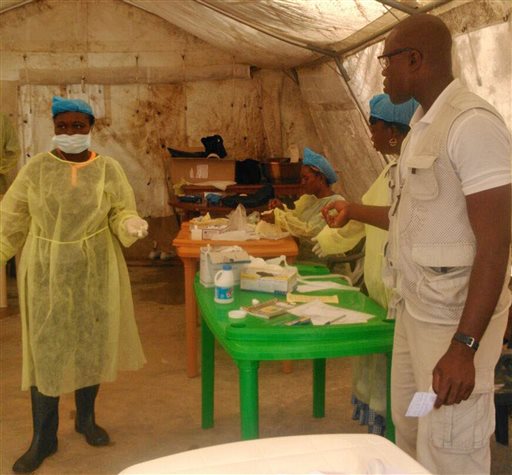U.S. warns against traveling to Ebola-hit countriesNEW YORK - U.S. health officials on Thursday warned Americans not to travel to the three African countries hit by an outbreak of Ebola.The travel advisory applies to non-essential travel to Guinea, Liberia and Sierra Leone. The outbreak in those West Africa countries has killed more than 700 people this year.The Centers for Disease Control and Prevention say the risk of the deadly disease coming to the United States remains small. The last time the federal agency issued such a travel warning was in 2003 because of a SARS outbreak in Asia.At the White House, press secretary Josh Earnest said the U.S. is looking into Medevac options to bring two American aid workers diagnosed with Ebola back to the U.S. While the U.S. government would facilitate the response, private companies would be used.Earnest said that type of response would be consistent with how the U.S. handled other situations, including outbreaks of SARS and drug-resistant tuberculosis, and the goal would be to ensure Americans can benefit from modern medical treatment available in the U.S.Although the CDC has concluded it's unlikely Ebola would spread if detected in the U.S, Earnest said the CDC is alerting health care workers in the U.S. and reminding them how to isolate and deal with cases of Ebola.The CDC has about two dozen staffers in West Africa to help try to control the outbreak. Officials announced Thursday they will send 50 more in the next month.- The Associated Press
DAKAR, Senegal - The worst recorded Ebola outbreak in history surpassed 700 deaths in West Africa as the World Health Organization on Thursday announced dozens of new fatalities.
In Sierra Leone, President Ernest Bai Koroma vowed to quarantine sick patients at home and have authorities conduct house-to-house searches for others who may have been exposed as the country struggles with families resisting treatment at isolation centers. Some have kept loved ones at home given the high death rates at clinics where Ebola patients are quarantined.
His announcement late Wednesday came as neighboring Liberia also ramped up its efforts to slow the virulent disease's spread, shutting down schools and ordering most public servants to stay home from work.
"It could be helpful for the government to have powers to isolate and quarantine people and it's certainly better than what's been done so far," said Dr. Heinz Feldmann, chief of virology at U.S. National Institute of Allergy and Infectious Diseases. "Whether it works, we will have to wait and see."
The U.S. Peace Corps also was evacuating hundreds of its volunteers in the affected countries. Two Peace Corps workers are under isolation outside the U.S. after having contact with a person who later died of the Ebola virus, a State Department official said.
Ebola now has been blamed for 729 deaths in four West African countries this year, and has shown no signs of slowing down particularly in Liberia and Sierra Leone. On Thursday, the WHO announced 57 new deaths - 27 in Liberia, 20 in Guinea, nine in Sierra Leone and one in Nigeria.
Among the deaths this week was that of the chief doctor treating Ebola in Sierra Leone, who was to be buried Thursday.
The government said Dr. Sheik Humarr Khan's death was "an irreparable loss of this son of the soil." The 39-year-old was a leading doctor on hemorrhagic fevers in a nation with very few medical resources.
Ebola cases first emerged in the nation of Guinea back in March, and later spread across the borders to Liberia and Sierra Leone. The outbreak is now the largest recorded in world history, and has infected three African capitals with international airports. Officials are trying to step up screening of passengers, though an American man was able to fly from Liberia to Nigeria, where authorities say he died days later from Ebola.
Ebola has no vaccine and no specific treatment, with a fatality rate of about 60 percent in this particular outbreak. But experts say the risk of travelers contracting it is considered low because it requires direct contact with bodily fluids or secretions such as urine, blood, sweat or saliva. Ebola can't be spread like flu through casual contact or breathing in the same air.
Patients are contagious only once the disease has progressed to the point they show symptoms, according to the World Health Organization. The most vulnerable are health care workers and relatives who come in much closer contact with the sick.
In Liberia, authorities say 28 out of the 45 health workers who have contracted the disease so far have died. Two American health workers sick with the virus remain in isolation.

